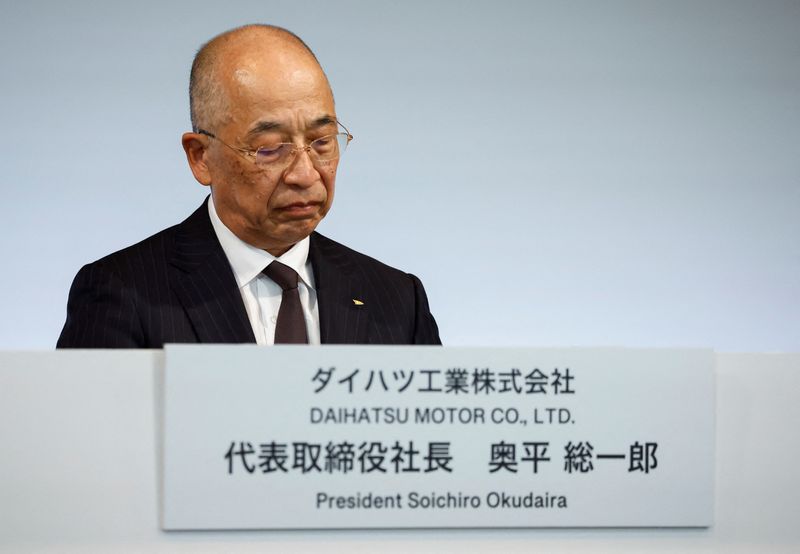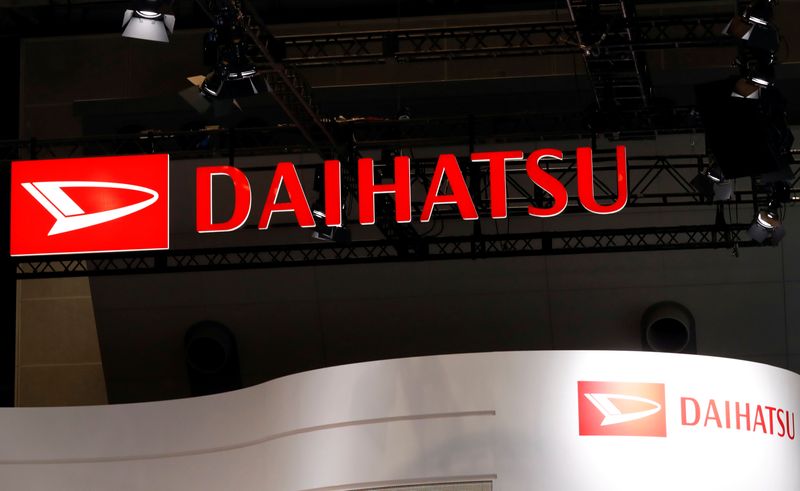By Daniel Leussink
TOKYO (Reuters) -Toyota Motor's Daihatsu unit will halt shipments of all of its vehicles, Japan's biggest automaker said on Wednesday, after a safety scandal investigation found issues involving 64 models, including almost two dozen sold under Toyota (NYSE:TM)'s brand.
An independent panel has been investigating Daihatsu after it said in April it had rigged side-collision safety tests carried out for 88,000 small cars, most of those sold as Toyotas.
But the latest revelations suggest the scope of the scandal is far greater and went back much further than previously thought and could potentially tarnish the automakers' reputation for quality and safety.
Daihatsu is Toyota's small-car unit and produces a number of the so-called "kei" smaller cars and trucks that are popular in Japan. The latest issues also impacted some Mazda and Subaru (OTC:FUJHY) models sold in the domestic market and Toyota and Daihatsu models overseas, the panel found.
Toyota said "fundamental reform" was needed to revitalise Daihatsu, as well as a review of certification operations.
"This will be an extremely significant task that cannot be accomplished overnight," Toyota said in a statement. "It will require not only a review of management and business operations but also a review of the organisation and structure."
Toyota said it could not yet determine the financial impact of the matter. Its shares closed flat on Wednesday, lagging a 1.4% rise in the broader market.
ON-SITE INSPECTION
The investigation found that the airbag control units used by Daihatsu in airbag tests for some models were different from the ones used in cars sold to the public, including Toyota's Town Ace and Pixis Joy models and the Mazda Bongo.
Toyota said it was not aware of any accidents related to the issue. It said side-collision tests of two models may not be law compliant even as verifications confirmed that the airbag met passenger safety standards.
Japan's transport ministry said it would carry out an on-site inspection at Daihatsu's headquarters in Osaka on Thursday.
Daihatsu executives told a press conference the overseas shipments will be suspended until the vehicles are cleared for sales again by regulators.
"The situation is extremely serious," Daihatsu President Soichiro Okudaira said, adding that any regulatory clearances the automaker received through fraudulent means could be revoked by law.
The misconduct also included false reports on headrest impact tests and test speeds for some models. The investigation found cases of misconduct were particularly prevalent after 2014 and, for one already-discontinued Daihatsu vehicle, went back as far as 1989.
Makoto Kaiami, the chair of the third-party investigation committee, said the panel did not believe that Toyota was responsible for the misconduct, but that Daihatsu was trying to meet expectations it had placed on itself.
The issue emerged after Daihatsu said in April it had discovered the wrongly conducted tests after a whistleblower report. It had reported the issue to regulatory agencies and halted shipments of affected models.
The following month, it said it had stopped sales of the Toyota Raize hybrid electric vehicle and its own Rocky model after also finding problems with testing for those models.
PREVIOUS SAFETY ISSUES AT TOYOTA
Daihatsu produced 1.1 million vehicles over the first 10 months of the year, nearly 40% of those at overseas sites, according to Toyota data. It sold some 660,000 vehicles worldwide over that period and accounted for 7% of Toyota's sales.
Toyota said on Wednesday affected models included those for the Southeast Asian markets of Thailand, Indonesia, Malaysia, Cambodia and Vietnam and Central and South American countries of Mexico, Ecuador, Peru, Chile, Bolivia and Uruguay.
Daihatsu is the latest safety issue to impact the Toyota group over the years.
An engine data scandal at Toyota's truck- and bus-making unit, Hino Motors, in 2022 led to resignations and temporary pay cuts for some managers.

In that case Hino admitted to falsifying data on some engines dating back to 2003, or at least a decade earlier than it originally indicated.
In 2010 Toyota Chairman Akio Toyoda, then chief executive, was forced to testify before U.S. Congress due to a safety crisis involving faulty accelerators.
